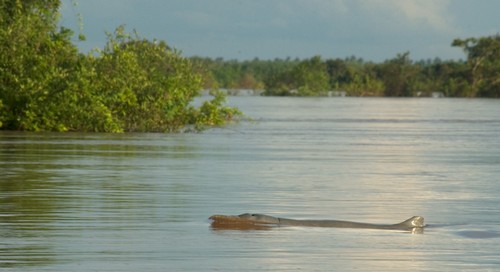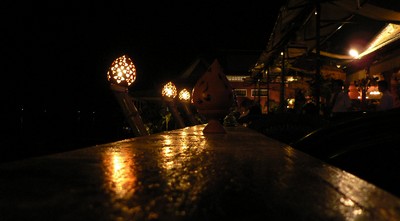
KINGDOM
OF CAMBODIA
SPOTTING IRRAWADDY DOLPHINS ON THE
MEKONG RIVER
|
 |


Spotting Irrawaddy Dolphins
on the Mekong river
There were about 1000 Irrawaddy river dolphins at Kratie a few decades
ago but due to the exploitation of natural resources of Cambodia by
unscrupulous Chinese, the dolphin population of Kratie and
neighbouring Steung Trean has plummeted to less than a hundred. The
local population of Kampi are extremely protective about the river
dolphin and are making an all out effort to protect these gentle
delicate creatures who show an almost human like intelligence. Spotting
the river dolphin along the banks of the Mekong in Kampi is as exciting
as a jungle safari in the wilds of Africa and one must visit Cambodia
and experience the magic of spotting the river dolphin as it is a soul
stirring journey.
One starts one's journey in the afternoon and makes the 15 km. drive
from Kratie to Kampi by a motorcycle in 30 minutes, as some parts of
the village roads are rough and bumpy. The road winds its way along the
western bank of the Mekong, and offers spectacular views of the river
and the lush greenery surrounding the opposite bank. The wide expanse
of the river at Kratie, almost makes it resemble an inland sea, with
the waters stretching from horizon to horizon. One can see small bamboo
huts, with palm leaved roofs, selling beautiful carvings and artecrafts
of dolphins and this announces the impending arrival of Kampi.
One stops at the entrance of the boat pier and pays the mandatory fee
at the entrance and makes one's way to the slow boats that are parked
on the banks of the river. These boats are equipped with diesel engines
to cross the fast flowing river, but on reaching the dolphin spotting
areas, the engines are switched off and the boat is anchored by a rope
to the mangroves that are scattered on the eastern banks of the river
and one begins one's wait for the Irrawaddy dolphins.
The boat cruise to the dolphin spotting areas takes about an hour and
the cool breeze blowing across the river makes one feel cold in the
height of the afternoon. Watching the flowing waters of South East
Asia's longest river which starts off as a tiny stream from the divine
lake Mansarovar in Tibet and makes its way down through Thailand and
Laos, before entering Cambodia and finally meeting the sea at Vietnam
is a hypnotic experience, especially when the engines are switched off.
Dolphins are extremely sensitive to the sounds and the best chance of
allowing a dolphin to approach one's boat is to anchor the boat in the
middle of the river and wait in pin drop silence for these creatures to
make their surface at regular intervals to breathe! The appearance of
the dolphin is preceded by a special sound which is the cue one needs
to start clicking the camera to get a good photograph before they dunk
beneath the waters.
Capturing
a river dolphin on the camera needs quick reflexes, a sharp eye and a
keen sense of hearing. First, one hears the sound of the dolphin as it
surfaces to breathe. Next, the dorsal fin protrudes out of the water,
resembling a small rock protruding out of the waters. A second later
one can see its grayish body for a fraction of a second before it
plunges in to the river, only to surface again, a few metres away
before disappearing again. Dolphins always travel in groups and more
often then not they move in pairs and it does get tricky, when two
dolphins surface at the same time! All one can do is enjoy the oxygen
rich air, perch oneself on the edge of the boat and continuously try to
be in the present, patiently waiting for these gentle mammals to
surface. One becomes an expert and trying to spot the fins of the
dolphin or watching the trail of surf that could indicate its location.
However,
the swirling waters of the river, the gently bobbing boat, the mild
sunshine and the cold breeze coupled with the patient wait on the boat,
makes dolphin spotting an ideal experience to relax to the tune of
nature and focus on the present. One almost forgets one's worries and
stops thinking of the future as on e is eagerly watching the next move
of this gentle animal.
The river dolphin is extremely supple and swift and can disappear and
appear in a split second. Even capturing them on a video camera is
difficult as now they are seen and now they vanish! However, if one
concentrates and keeps one's attention in the present it is possible to
get some amazing pictures of these river dolphins. Going in pursuit of
these dolphins is an exercise in futility as dolphins have an acute
sense of hearing and race away on hearing the slightest sound of the
boat's engine.
Also, dolphins have an aversion to any humming sound and tend to move
away from all such sounds. Almost all modern day appliances like
refrigerators, air-conditioners, washing machines, airplane engines,
motor cars, motorcycles and scooters make sounds that affect the brain
waves of humans as well as dolphins and increase the amount of stress.
Hence, one indicates to the boat man to switch off the engines as early
as possible and wait in silence for the dolphins to venture near the
boat. Nature rewards patience and in about an hour, two dolphins,
moving in synchronicity surface near one's boat and continue to
playfully frolic around, offering a rare opportunity to capture them on
one's digital camera.
However, this itself is no easy task and one can get only a few good
pictures after several hours of waiting and watching for the dolphins
to surface. After about four house of waiting, the message spreads
among the dolphin community and more of these delicate darlings begin
to surface but they keep a safe distance from one's boat, as they
become secure that the boat won't start its engines and follow
them. The return to one's pier is a journey in serenity,
calmness and peace, having successfully completed one's tryst with the
Irrawaddy river dolphin.
How to get to Phnom Penh?:
Phnom Penh is connected by direct flights from Bangkok, Kuala Lumpur,
Hong Kong, Singapore and Hanoi. The easiest way for Indian tourists to
get to Phnom Penh is to fly to Bangkok and take the Air Asia flight
from Bangkok to Phnom Penh. This flight ticket by budget airline Air
Asia should cost no more than 5000 Baht (Rs. 6000/-) for the return
ticket, if booked 15 days in advance on the internet. It is advisable
to stay overnight at Phnom Penh before making the long bus journey to
Kratie. From Kratie one has to travel 15 km. to Kampi to watch the
dolphins. This journey can be made by a motor-bike taxi for U.S$
3 (includes pickup from one's hotel to drop back and includes
waiting charges). The entrance fee to the Dolphin Conservation Area is
US$ 7, which includes a three hour chartered boat cruise along with a
boatman who also doubles as a guide.
Where to stay at Phnom Penh?:
Cambodiana Hotel, located on the banks of the Tonle Sap River is the
most convenient location to stay, as almost all tourist attractions
including Grand Palace, Museum and Silver Pagoda are easy to reach.
Also the hotel is itself located on the banks of the Tonle Sap river
offering spectacular views if one can manage a river facing room by
booking well in advance. The average room tariff at Cambodiana
inclusive of taxes and buffet breakfast ranges from US$ 80 to
US$ 100 (Rs. 3000 to Rs. 4000) per night in the low season which is
from August to October.
Where to stay at Kratie?:
Riverside Hotel offers basic fan-rooms at U.S$ 5 per night. No hot
water showers are provided. It is ideal for a overnight stay. There are
a few high end hotels at Kratie offering air-conditioned rooms with hot
showers for U.S.$ 15 per night for those who wish to stay longer at
Kratie.
Where to eat at Phnom Penh?:
Many small restaurants
serving Khmer, Thai and Indian cuisine are found near Sisaworth Quay in
Phnom Penh. Steamed beansprouts with flat rice noodles and Chinese
Spinach garnished with celery is a local dish which is good to taste
and nutritious.. This dish as delicious to eat as it is pleasing to the
eyes. The food at the high
profile hotels is only for the gastronomically adventurous
who like greasy food. Fresh tropical fruits including papayas,
pineapples and watermelons are available at the local market. Siam City
Hotel's buffet breakfast has a selection of fresh fruits,
water-melon juice, orange juice, fresh vegetable salad and rice soup
for vegans who don't consume any product of animal origin or products
which contain minute traces of any product of animal origin.
Shere-Punjab is a tiny restaurant serving Indian cuisine and the Indian
chefs are happy to whip up pure vegetarian meals on request. The Dal
Handi which goes well Chappatis and aloo jeera, is recommended. An
average vegetarian meal for two should not exceed US$6 (Rs. 240/-)
Where to eat at Kratie?:
Many street vendors selling everything from sliced fruits to fruit
juices to stir fried rice noodles are found by the riverside promenade.
Vegans can get a delicious mixture of grated coconut, baked with rice
and sprinkled with baked beans and packed in environment friendly
bamboo containers. Each bamboo stick is about 1 feet long and 2
centimetres in diameter and costs 2000 riel (Rs. 20/-) and makes an
ideal breakfast for one person. This delicacy tastes similar to
kozhekkata or puttu made in Kerala. However, no sugar is added to this
sticky baked rice snack. Tender coconuts are available at street
corners. A bigger version of litchee called rambutan is juicy and
filling and a smaller version of the litchee is delicious and one can
eat lots of it to replenish fluids during the long bus journey. Star
Restaurant at the market serves hot steamed rice with vegetable curry
(includes boiled potatoes, beans and carrots steamed to perfection with
Khmer spices like galagal and lemongrass in a coconut-milk gravy) for
U.S.$ 3 which is a lip smacking , tasty meal in itself. The quantity is
sufficient for two people.


FIRST
CLASS AROUND THE WORLD

|






